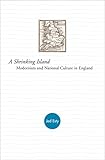A Shrinking Island : Modernism and National Culture in England / Jed Esty.
Material type: TextPublisher: Princeton, NJ : Princeton University Press, [2009]Copyright date: ©2004Edition: Course BookDescription: 1 online resourceContent type:
TextPublisher: Princeton, NJ : Princeton University Press, [2009]Copyright date: ©2004Edition: Course BookDescription: 1 online resourceContent type: - 9780691115498
- 9781400825745
- English literature -- 20th century -- History and criticism
- Imperialism in literature
- Literature and anthropology -- England -- History -- 20th century
- Literature and society -- England -- History -- 20th century
- Modernism (Literature) -- England
- Nationalism in literature
- Postcolonialism in literature
- LITERARY CRITICISM / European / English, Irish, Scottish, Welsh
- 820.9/112 21
- PR478.M6 E85 2004
- online - DeGruyter
- Issued also in print.
| Item type | Current library | Call number | URL | Status | Notes | Barcode | |
|---|---|---|---|---|---|---|---|
 eBook
eBook
|
Biblioteca "Angelicum" Pont. Univ. S.Tommaso d'Aquino Nuvola online | online - DeGruyter (Browse shelf(Opens below)) | Online access | Not for loan (Accesso limitato) | Accesso per gli utenti autorizzati / Access for authorized users | (dgr)9781400825745 |
Frontmatter -- Contents -- Acknowledgments -- Introduction: Late Modernism and the Anthropological Turn -- 1. Modernism and Metropolitan Perception in England -- 2. Insular Rites: Virginia Woolf and the Late Modernist Pageant-Play -- 3. Insular Time: T. S. Eliot and Modernism's English End -- 4. Becoming Minor -- Notes -- Index
restricted access online access with authorization star
http://purl.org/coar/access_right/c_16ec
This book describes a major literary culture caught in the act of becoming minor. In 1939, Virginia Woolf wrote in her diary, "Civilisation has shrunk." Her words captured not only the onset of World War II, but also a longer-term reversal of national fortune. The first comprehensive account of modernism and imperialism in England, A Shrinking Island tracks the joint eclipse of modernist aesthetics and British power from the literary experiments of the 1930s through the rise of cultural studies in the 1950s. Jed Esty explores the effects of declining empire on modernist form--and on the very meaning of Englishness. He ranges from canonical figures (T. S. Eliot and Virginia Woolf) to influential midcentury intellectuals (J. M. Keynes and J.R.R. Tolkien), from cultural studies pioneers (Raymond Williams and E. P. Thompson) to postwar migrant writers (George Lamming and Doris Lessing). Focusing on writing that converts the potential energy of the contracting British state into the language of insular integrity, he argues that an anthropological ethos of cultural holism came home to roost in late-imperial England. Esty's interpretation challenges popular myths about the death of English literature. It portrays the survivors of the modernist generation not as aesthetic dinosaurs, but as participants in the transition from empire to welfare state, from metropolitan art to national culture. Mixing literary criticism with postcolonial theory, his account of London modernism's end-stages and after-lives provides a fresh take on major works while redrawing the lines between modernism and postmodernism.
Issued also in print.
Mode of access: Internet via World Wide Web.
In English.
Description based on online resource; title from PDF title page (publisher's Web site, viewed 08. Jul 2019)


